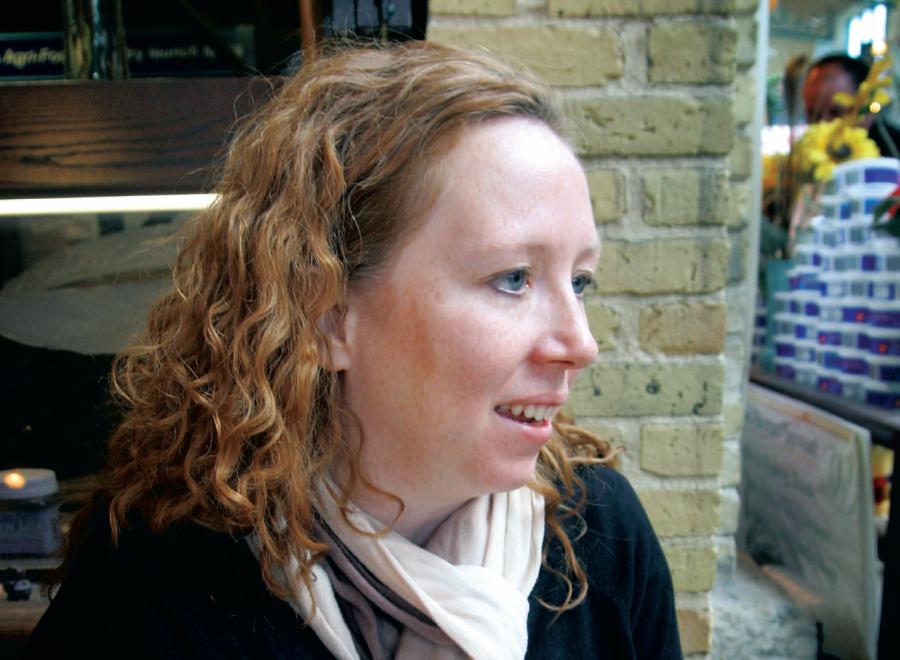Tricia Cooper is Winnipeg’s funny woman and a regular contributor to CBC radio’s Definitely Not the Opera. She talks to Karen Stiller about comedy and the United Church she calls home.
KAREN STILLER: What makes you think you’re so funny?
TRICIA COOPER: I never decided I was going to be a comedian. I was in theatre and wanted to do all kinds of stuff. I loved Shakespeare and musical theatre. A group of friends started a sketch comedy troupe, and it seemed to be the thing I was most comfortable doing. I have trouble writing anything serious now. I always want to make a joke of it, which is not always the best thing. If I’m working on something serious that I am performing or writing, I just want to make fun of it.
KS: Is there a deep, dark psychological reason for that?
TC: Hmm. Maybe. Are you like a therapist as well as a journalist? Do I write from my pain? Possibly. No, actually I heard Tina Fey interviewed about whether or not comedians were all in pain, and she said that the men are, but that funny women can have a totally normal upbringing. I thought, that makes sense. I don’t really have a horrible childhood to make fun of.
KS: Do you ever use the church in your material?
TC: The United Church is so different from other churches; there’s not a lot to make fun of. It wasn’t like a scary place where I went to get judged and shamed and stuff. I did write a piece about being at a funeral and having people come up to you and say all those horrible and awkward things that we all say to each other, based on when my own father died, but that wasn’t so much about the church.
KS: How important is humour in surviving life’s ups and downs?
TC: It’s huge. I wouldn’t know how to do it without it. My family has always dealt with everything with humour. We’re sappy and sentimental and cry over all kinds of things, but we usually laugh a lot. My partner is extremely funny.
KS: Do you and your partner try to out-funny each other?
TC: We boo each other. With Definitely Not the Opera, I’ve been writing a lot about him and having a child. Sometimes the stories get blown out of proportion, so he wants an outlet to make fun of me on national radio.
KS: What about when humour gets mean? How do you feel about that?
TC: I would feel terrible if I ever really hurt someone’s feelings. I’ve written about something and then cut it later because it’s something a friend actually went through. It didn’t feel good to have it in the show anymore. But I think that happens. Something gets personalized, and it’s not funny anymore. I can make fun of myself and my family though. I’m a huge fan of Sarah Silverman and David Cross, who are very nasty sometimes. I can laugh at it.
KS: What about humour as politics? Like Tina Fey doing Sarah Palin. Or humour as social change. Can humour be a force like that?
TC: It totally can. I wrote a fun piece after Stephen Harper cut funding for the arts, about all the artists who must have hurt him during his life. Often when we’re laughing, we are recognizing something in our heads that is true. You can really make people think.
KS: You have confessed to me that you are a Christmas/Easter United Church attendee. When you do go, if you could change something to make it more engaging, what would you say to a minister? Lighten up? Be funny?
TC: Yeah! The church that I grew up in, Fort Garry United in Winnipeg, had two ministers in a row who were really funny. They aspired to that. They had good shtick. There could be a little more back and forth as opposed to “I’m up here to talk.” I’m stupid-sentimental about our choir. They sing; I cry. They were a huge community of support for us when my dad died, so I look up and see them up there and cry and think, “I love the choir!” Now there is a member of the choir who wants me to cry and asks, “Did we get you?”
KS: What’s your type of humour? Who do you find funny?
TC: There’s a guy who refers to his four-year-old daughter by a swear word. The idea of talking about your kid that way is so hilarious to me, the thing we all think but never say out loud.
KS: Is that part of the role of a comedian, to say out loud what everyone else is thinking?
TC: Oh, sure. The better joke is to talk about how you were feeling greedy or annoyed or something. You want to be self-deprecating but sometimes you aren’t actually bothered by the neighbours or by your husband, but it’s better comedically if you are, so . . .
KS: The temptation to exaggerate for impact is always there.
TC: Yes, absolutely. Hopefully, I’m very careful. I’m writing a play right now about a family in Winnipeg who takes in a refugee, and all wackiness ensues. My mother did take in a Sudanese refugee that she had never met to live with her, and it was totally this generous, amazing thing she did. But the characters aren’t my family, and anyone who knows my mom will know that it’s not her.
KS: Live performances come with risk. Have you ever bombed?
TC: Oh, yeah. With a fringe festival, we had to cancel some shows because no one came. I hosted a cabaret once, and my job was to MC and respond to whatever was going on. I deliberately didn’t have a lot prepared. But later, there was a reviewer who said, “The hilarious Trish Cooper seemed woefully unprepared.”
KS: Ouch. Did that hurt? Are you a sensitive soul?
TC: I am, but not about stuff like that. It was true. I can take some criticism, but when you’re in the moment performing, often your low moments can be your high moments. The recovery can be fun. In improv, the audience loves to watch you recover, but it’s a scary place to go to. If you’re so ultra-prepped and don’t make room for improv, you’re kind of stuck in that place. But it’s scary. I did The Comment Card [a solo show about the travails of being a waitress] in three cities, and I never felt relaxed and calm before I went on.
KS: When you’ve performed material a bunch of times, do you find yourself thinking, “How is this funny?”
TC: I’ve had that feeling before, that “This is not funny at all,” and then they laugh. I was writing a bit about people who give you too much information. You ask them, “How are things going?” and they tell you all about their breastfeeding misadventures. CBC wouldn’t let me say “nipple.” So, the funny got taken out. Sometimes that’s the fight I have. I get that you can’t say swear words, but why can’t you say “nipple”? But also, we don’t all laugh at the same stuff.
KS: What, if anything, do you find funny on TV?
TC: I love 30 Rock. I had a dream once that Tina Fey and I were friends.
***
This story first appeared in The United Church Observer’s May 2009 issue with the title “‘Often when we are laughing, we are recognizing something that is true.’”


Comments